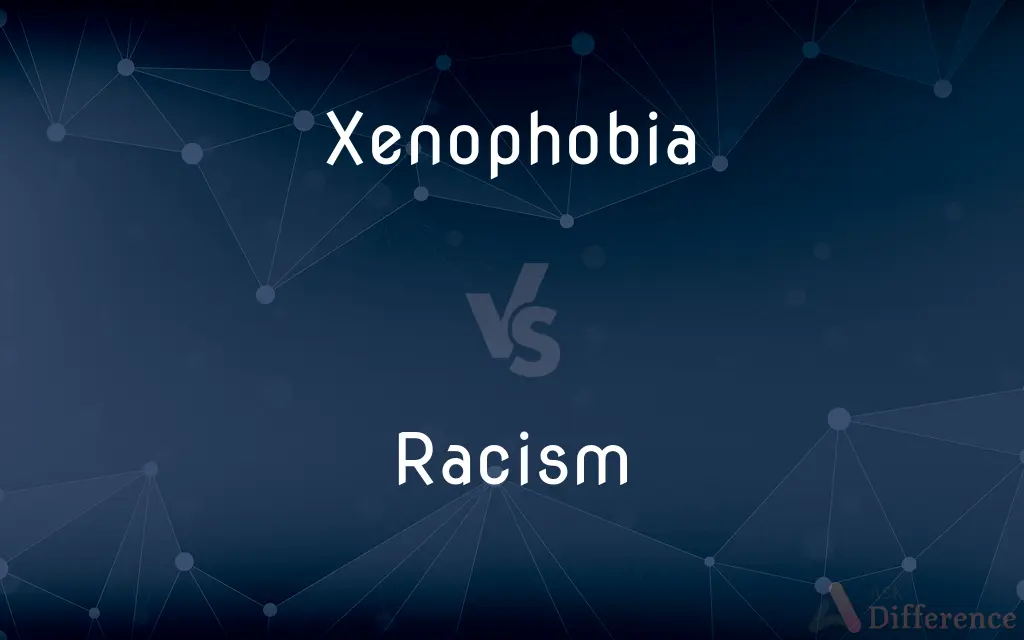Xenophobia vs. Racism — What's the Difference?
Edited by Tayyaba Rehman — By Fiza Rafique — Updated on March 24, 2024
Xenophobia involves a fear or hatred of foreigners or strangers, focusing on cultural or national differences, while racism centers on beliefs of racial superiority and inferiority, targeting specific racial groups.

Difference Between Xenophobia and Racism
Table of Contents
ADVERTISEMENT
Key Differences
Xenophobia is characterized by an irrational fear or dislike of people from other countries or cultures, manifesting in social exclusion and discrimination. This attitude often stems from a perceived threat to national identity or societal norms. Whereas racism involves prejudiced beliefs or discriminatory practices based on racial differences, asserting the superiority of one race over another. It's deeply rooted in historical power dynamics and societal structures.
While xenophobia may manifest in a reluctance to engage with or accept cultural practices different from one's own, leading to social and sometimes legal barriers against foreigners, racism specifically targets individuals based on their racial or ethnic backgrounds, often resulting in systemic inequalities. On the other hand, both can intersect, as xenophobic attitudes can also harbor racial prejudices, complicating the discrimination faced by individuals who are both foreign and of a distinct racial or ethnic group.
Xenophobia often emerges from a fear of the unknown or the loss of social or economic status due to the presence of foreigners, leading to protective measures against perceived threats. Meanwhile, racism is sustained by historical and institutional legacies that advantage certain races at the expense of others, perpetuating disparities in access to resources, representation, and justice.
In combating xenophobia and racism, efforts differ; anti-xenophobia campaigns may focus on promoting cultural exchange and understanding, whereas anti-racism initiatives tackle structural inequalities and advocate for systemic change. Both require addressing underlying fears and stereotypes but through somewhat different strategies reflecting their distinct natures.
Comparison Chart
Definition
Fear or hatred of foreigners or their culture
Belief in racial superiority and inferiority
ADVERTISEMENT
Focus
Cultural or national differences
Racial or ethnic differences
Manifestation
Discrimination against foreigners
Discrimination based on race
Root Cause
Fear of the unknown, loss of status
Historical power dynamics, societal structures
Combat Strategies
Promoting cultural exchange, understanding
Addressing structural inequalities, systemic change
Compare with Definitions
Xenophobia
Can lead to social isolation of individuals from different backgrounds.
His xenophobia prevented him from interacting with his international colleagues.
Racism
Leads to systemic discrimination in various aspects of society.
Racism in hiring practices results in fewer job opportunities for certain groups.
Xenophobia
Often fueled by economic insecurities and job competition.
Economic downturns often see a spike in xenophobia among the local population.
Racism
Can be institutional, affecting systems like law enforcement and education.
Institutional racism results in unequal treatment of minorities in the justice system.
Xenophobia
A deep-rooted fear towards foreigners or strangers.
The town's xenophobia made it difficult for new immigrants to feel welcomed.
Racism
A belief system asserting the superiority of one race over others.
Segregation was a policy rooted in racism.
Xenophobia
Sometimes expresses itself through violent actions or protests.
The rally turned violent, showcasing deep-seated xenophobia.
Racism
Often passed down through generations, perpetuating stereotypes.
His family's racist beliefs influenced his worldview from a young age.
Xenophobia
Manifests in nationalistic policies aimed at preserving cultural identity.
The government's strict immigration laws were a reflection of rising xenophobia.
Racism
May manifest in microaggressions or overt acts of violence.
The racially charged comments were examples of everyday racism.
Xenophobia
Xenophobia (from Ancient Greek: ξένος, romanized: xénos, meaning "stranger" or "foreigner", and Ancient Greek: φόβος, romanized: phóbos, meaning "fear") is the fear or hatred of that which is perceived to be foreign or strange. It is an expression of perceived conflict between an ingroup and an outgroup and may manifest in suspicion by the one of the other's activities, a desire to eliminate their presence, and fear of losing national, ethnic or racial identity.
Racism
Racism is the belief that groups of humans possess different behavioral traits corresponding to physical appearance and can be divided based on the superiority of one race over another. It may also mean prejudice, discrimination, or antagonism directed against other people because they are of a different race or ethnicity.
Xenophobia
Fear of, hatred of, mistrust of, or contempt for that which is foreign, especially strangers or people from different countries or cultures.
Racism
The belief that race accounts for differences in human character or ability and that a particular race is superior to others.
Xenophobia
A hatred of strangers or foreigners.
Racism
Discrimination or prejudice based on race.
Xenophobia
A fear of strangers or foreigners.
Racism
The belief that there are distinct human races with inherent differences which determine their abilities, and generally that some are superior and others inferior.
Xenophobia
A strong antipathy or aversion to strangers or foreigners.
Racism
The policies, practices, or systems (e.g. government or political) promoting this belief or promoting the dominance of one or more races over others.
Martin Luther King spoke out against racism.
Xenophobia
A fear of aliens.
Racism
Prejudice or discrimination based upon race or ethnicity; (countable) an action of such discrimination.
Xenophobia
An irrational fear of foreigners or strangers
Racism
The prejudice that members of one race are intrinsically superior to members of other races
Racism
Discriminatory or abusive behavior towards members of another race
Common Curiosities
What is xenophobia?
Xenophobia is the fear or dislike of foreigners or strangers, often manifesting in discrimination.
What is racism?
Racism is the belief that races have distinct characteristics, abilities, or qualities, particularly to distinguish them as inferior or superior to one another.
What causes xenophobia?
Causes include fear of the unknown, economic insecurity, and perceived threats to national identity or values.
How do xenophobia and racism differ?
Xenophobia is primarily about cultural or national differences, while racism deals with racial superiority and inferiority.
Can xenophobia lead to racism?
Yes, xenophobic attitudes can intersect with and exacerbate racist beliefs and practices.
What role does education play in combating racism?
Education can challenge prejudiced beliefs, promote understanding, and highlight the contributions of various racial groups to society.
Can someone experience both xenophobia and racism?
Yes, individuals who are both foreign and of a different racial or ethnic background can face compounded discrimination.
Is xenophobia always about nationality?
Primarily, but it can also encompass a general fear or dislike of anyone perceived as "other," including different ethnicities within the same country.
How do xenophobia and racism affect immigration?
They can lead to restrictive immigration policies and hostile environments for immigrants and refugees.
What are the consequences of racism?
Racism leads to systemic inequalities, social division, and psychological harm to individuals and communities.
How can society combat xenophobia?
Through education, cultural exchange, and policies that encourage diversity and inclusion.
What is systemic racism?
Systemic racism refers to the embeddedness of racial discrimination within societal structures and institutions.
What is the impact of xenophobia and racism on global society?
They contribute to global tensions, hinder international cooperation, and harm multicultural communities by fostering division and conflict.
Are xenophobia and racism legal issues?
Yes, both can be addressed through laws and policies aimed at preventing discrimination and promoting equality.
How do personal experiences influence xenophobia and racism?
Personal experiences, including exposure to different cultures or education about history, can significantly influence one's views on xenophobia and racism.
Share Your Discovery

Previous Comparison
Department vs. Branch
Next Comparison
Zeroized vs. ZeroizeAuthor Spotlight
Written by
Fiza RafiqueFiza Rafique is a skilled content writer at AskDifference.com, where she meticulously refines and enhances written pieces. Drawing from her vast editorial expertise, Fiza ensures clarity, accuracy, and precision in every article. Passionate about language, she continually seeks to elevate the quality of content for readers worldwide.
Edited by
Tayyaba RehmanTayyaba Rehman is a distinguished writer, currently serving as a primary contributor to askdifference.com. As a researcher in semantics and etymology, Tayyaba's passion for the complexity of languages and their distinctions has found a perfect home on the platform. Tayyaba delves into the intricacies of language, distinguishing between commonly confused words and phrases, thereby providing clarity for readers worldwide.












































